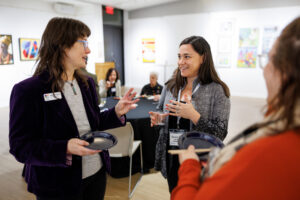-
17 July 2025
By: Lisa Handleman, Director of Inclusion & Belonging
As an advocate for disability inclusion, I have observed several pathways that organizations take as they strive to become more inclusive of individuals with disabilities. For some, change is slow but steady, and for others, progress starts but then backslides. Some organizations agree wholeheartedly with the goal of improved inclusivity but struggle to know where to start, while others are leaders in the field and recognized for setting a standard.
In The Tipping Point, Malcolm Gladwell describes the moment when a new idea gains momentum and becomes widespread—when it “crosses a threshold, tips, and spreads like wildfire.” What does it take for disability inclusion to reach that kind of tipping point in our community?
For the past year, Federation gathered nine local Jewish organizations—Gather DC, Sixth & I, MemGlobal, OneTable, Bender JCC, Edlavitch DC JCC , Pozez JCC Northern Virginia, B’nai Israel Congregation, and Temple Rodef Shalom—to help answer that question. Each joined the inaugural Lieberman Fellowship for Jewish Organizations Serving Young Adults, a new initiative created by Matan, a national organization that partners with Jewish communities to advance disability inclusion.
Over the course of a year, fellows engaged in a structured curriculum, received mentorship, and developed customized inclusion impact plans for their organizations. Along the way, many saw their perspectives shift.
Some began the fellowship feeling confident in their inclusion efforts, only to realize that there was much more to learn. Others started with uncertainty but emerged with new skills, clarity, and commitment. One participant reflected that she had once viewed inclusive social spaces as too complex to create, but now sees them as essential for building stronger, more connected communities. Fellows also discovered that challenges they assumed were unique were, in fact, common across institutions.
Key lessons included how to communicate effectively about accommodations, how to prioritize social and emotional well-being for all, and how to sustain momentum with support from peer accountability partners. Each fellow spoke with conviction about their organization’s next steps, and the passion was palpable.
These inclusion impact plans represent real, concrete progress. From updating facilities and technology to adding sensory kits and support roles, the work is already underway. The plans also include ongoing staff training and the integration of accessibility into everyday operations. Federation is proud to support these efforts with targeted grant funding.
“Na’aseh ve-nishma” is the Jewish concept rooted in the Torah that translates to “we will do, and then we will hear (and understand). The Lieberman fellows took a commendable step by participating in a year-long learning experience. By working with a mentor, learning directly from individuals with disabilities, from experts in the field, and from each other, their personal understanding evolved.
Doing and understanding are both essential components. Providing accommodations needs to become standard operating procedure. With access, individuals with disabilities will have a seat at the proverbial table. But access alone won’t lead to a tipping point. Individuals with disabilities need to be seen as valuable members of the organization; everyone needs to be co-partners in forming trusting relationships, and everyone needs to agree on the shared mission of the organization.
The tipping point occurs when an organization views the inclusion of individuals with disabilities as “who they are” and not just “what they do.”
Kudos to the nine local organizations that have committed to taking the next step forward in their individual inclusion journeys. We look forward to the day when the work they are doing becomes a part of our entire community.

